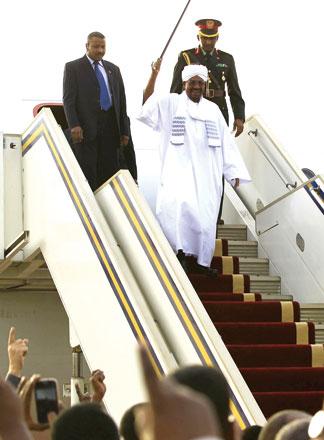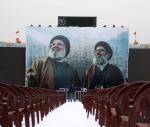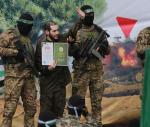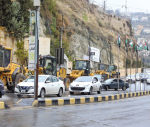You are here
Sudan’s Bashir returns home from South Africa
By AP - Jun 15,2015 - Last updated at Jun 15,2015

Sudanese President Omar Bashir salutes his supporters as he disembarks from the plane, after attending an African Union conference in Johannesburg, South Africa, at the airport in the capital Khartoum, on Monday (Reuters photo)
KHARTOUM — Sudanese President Omar Bashir arrived in Khartoum on Monday to cheers of supporters after leaving South Africa, where a court had ordered his arrest based on an international warrant for war crimes charges.
Bashir raised a stick in the air as he stepped out of the plane, waving to a few hundred supporters who greeted him at the airport. Some chanted "God is Great" while others cried with joy.
A South African court ruled that Bashir, who was attending an African Union summit, should be arrested. The ruling came after he left.
Bashir, in office since a 1989 military coup, is wanted by the International Criminal Court (ICC) on war crimes allegations linked to the conflict in Sudan's Darfur region.
At the Khartoum airport, supporters of the president raised posters reading "Lion of Africa" scribbled next to a picture of Bashir in military uniform and carried a coffin with a white sheet wrapped around it reading: "The ICC to its last resting place."
Sudanese Foreign Minister Ibrahim Ghandour said: "The president will continue his participation [in international events] as usual and the attempts to distract us will not sway us."
In Geneva, UN Secretary-General Ban Ki-moon said the International Criminal Court's authority must be respected.
However, a Pretoria court's ruling that Bashir should be arrested came after he had left the country and in defiance of an earlier court order that he should remain in the country while judges deliberated on the matter.
Judge Dunstan Mlambo criticised the South African government for failing to heed the instructions of the court.
"It is of concern to this court that we issued orders and then things just happened in violation of those orders," Mlambo said.
ICC Deputy Prosecutor James Stewart said in an interview with The Associated Press in the Hague, where the court is based, that "in our view it was very clear" that South Africa should have detained Bashir so he could have been brought to trial in the Hague.
"Their obligation was to arrest President Bashir," Stewart told AP.
"I think, however, what is important to remember is that we act really in the interest of victims," he added. "The concern of the prosecutor is for the victims of dreadful atrocities and these victims are Africans."
The ICC’s charges against Bashir stem from reported atrocities in the conflict in Darfur in which 300,000 people were killed and 2 million displaced in the government's campaign, according to UN figures.
South African officials have declined to comment, though William Mokhari, an attorney for the South African government, said African leaders at the summit in Johannesburg had immunity.
Leaders of the African Union are cautious about interfering in each other's affairs and highlighting alleged human rights abuses on a continent with a history of conflict. Critics of the ICC also say it has unfairly targeted African leaders. But Stewart said most of the African cases were initiated by African governments themselves.
At one point, Mokhari, the South African government lawyer, told the judges that there was no risk of Bashir "disappearing" while he attended the summit.
But soon after he uttered those words, South African journalist Erika Gibson tweeted photographs of what she said was Sudan's presidential jet taking off from a South African military base. Sudanese state media then said Bashir had left South Africa and that a news conference will be held at the Khartoum airport upon his arrival.
Elise Keppler, international justice acting director for US-based Human Rights Watch, said an opportunity to bring Bashir to justice had been missed.
"By allowing this shameful flight, the South African government has disregarded not only its international legal obligations, but its own courts," she said in a statement.
Bashir appeared in a group photo with other African heads of state on Sunday at the summit. The African Union had previously asked the ICC to stop proceedings against sitting presidents and said it will not compel any member states to arrest a leader on behalf of the court.
In a government notice published June 5, South Africa's minister of international affairs, Maite Nkoana-Mashabane, signed an agreement granting diplomatic immunity to delegates participating in the African Union summit.
The Southern Africa Litigation Centre, a rights group, had gone to court to press for Bashir's arrest.
Related Articles
JOHANNESBURG — A South African judge barred Sudan's indicted president from leaving the country on Sunday, in a deepening rift between Afric
UNITED NATIONS — Sudan's President Omar Al Bashir, who faces international war crimes and genocide charges, is on a provisional list of spea
KHARTOUM — Sudan has agreed to hand ousted autocrat Omar Al Bashir and others to the International Criminal Court (ICC) for alleged war crim















